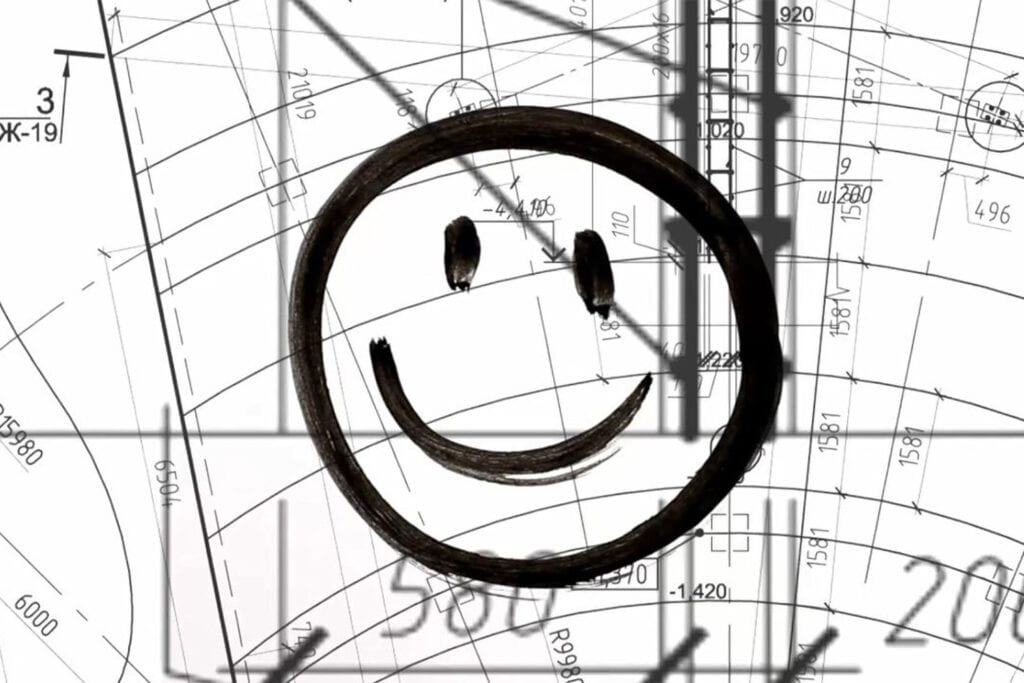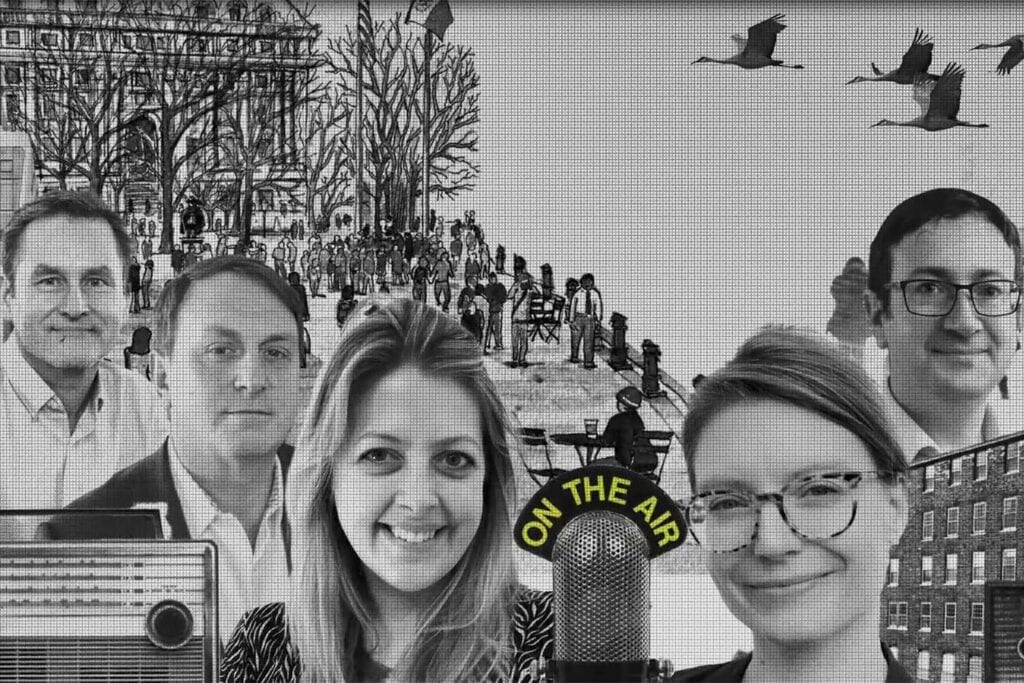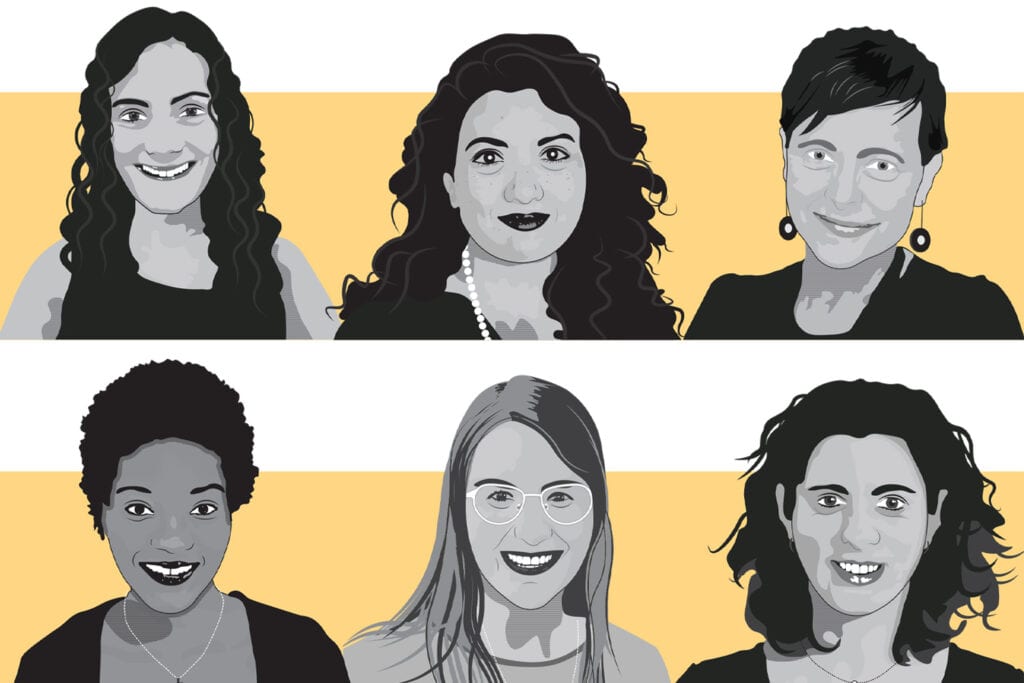
Building equity
How do you create an equitable organisation? Around the world, companies are grappling with this question as diversity, inclusion, equal opportunity and hybrid working becomes more important.
Interviewer and podcast host Victoria Bentley speaks to new Partners Federico Cassani, Amit Deshmukh, Matthew Harrison, Julie Janiski and Anna Wendt about equity at Buro Happold.
They discuss the role of policies and behaviour within our company and the wider built environment industry. They also explore what practical steps we can all take to ensure everyone feels empowered, whatever their background. We all have a responsibility to diversify our industry and promote a culture of inclusivity.
Listen to the full episode and read the abridged transcript of their conversation.
What makes an organisation equitable?
Anna: An equitable organisation is one that doesn’t just acknowledge inclusion and diversity and equity, but one that actually embeds policies and principles within its business strategy, and in the day-to-day running of the business. It makes staff feel valued, safe and secure, as well as giving everyone a voice and making sure that they have a support network around them.
Equity is about having proportional representation at all levels of the business. This representation must cover all sectors of society, different social and ethnic backgrounds, different genders, sexual orientations and disabilities. Having equity in a business increases satisfaction and enjoyment from the staff as they feel part of something. It leads to better staff retention and better productivity. It also fosters open-mindedness and innovation.
Amit: It’s important that people aren’t frightened to talk about the way they feel. Equity is about having people who are prepared to speak and are also free to do so.
Matthew: I just wanted to add to Amit’s comment; equity is where people are prepared to talk, and others are prepared to listen. Equity is when there’s a value based on listening, and there are opportunities for people to speak freely as they wish.
Julie: I agree. I think in addition to the idea of everyone understanding and feeling safe, equity means being listened to. Equity means things can change, based on what we’re hearing as leaders. Over the coming years, I want to enact a real shift in terms of the policies and behaviour of the leadership. The biggest part of that is going to be the engagement of the existing Partners, their willingness to listen and to enact change based on everything that they’re hearing.
Federico: I think one of the most important things is satisfaction, because if you’re satisfied, it means that you have access to equitable growth. It’s fundamental that all Buro Happold employees enjoy what we’re doing. We’re not a “brand”, we’re made of people and we need to value them. We need to be sure that all our people are in the same position to grow and enjoy themselves.
Is it enough to say you’re an equitable organisation? Do we have to show real change?
Julie: The moment for Buro Happold to shine is right now. There’s a really significant shift between what the current Partnership looks like, feels like and who it represents, to the next step that we’re taking as new Partners. It’s not just about what it looks and feels like, but what it does. We have an opportunity to really shift the way we’re thinking.
I love Federico’s notion that an equitable organisation is ultimately about equitable opportunities for every staff member, whether they’re a new Partner or a new colleague joining from university. It’s the idea is that everyone has representation. They know what their career at Buro Happold could look like at every level.
Obviously we’re talking about Buro Happold specifically here. Do you think this move to recognise equity is vital for business? Is it part of a wider industry trend? What can we do at Buro Happold to influence change across the entire AEC industry?
Anna: I think it’s part of a wider trend. Historically, we’ve blamed the fact that there’s not enough diversity coming into the industry. That’s no longer is a valid excuse. The industry has collectively acknowledged that we need to make changes to ensure that we’re retaining talent. I think that the levels of diversity and education are pretty good, but there’s definitely improvements that can be made. It’s not right to just try and be equitable, it’s also beneficial for the business and for the people.
I think the best thing we can do is learn from each other. There’s no point in each business reinventing the wheel; there are things that work and things that don’t. It’s about “walking that talk” and actually doing things. The Royal Academy of Engineering in the UK has an incredible diversity and inclusion programme. It’s gathered information from different policies, training, and employee affinity groups, and looked at how they’ve performed in terms of actually improving the inclusive culture within businesses. The best thing that we can do is come together and really learn from each other.
Matthew: Traditionally, construction has been the least innovative of sectors. The only one less innovative has been the retail sector. If you look at what has happened globally with the Covid-19 pandemic, retail is having to reimagine how it does business. Construction also has to reimagine how it works. I think we can genuinely look forward to a big leap forward in innovative practice within our industry as a direct result of the pandemic.
That predictable week-on-week pattern of working was the norm in 2019, but I think people are expecting something different now. And if they’re expecting something different from their employer on flexible working hours and practices, let’s not be surprised when they want something different in terms of engagement, equity, and the diversity that drives that.
Are you feeling positive about the future, and the idea that things are going to change? What non-obvious things can we do to make the AEC industry more equitable?
Julie: I don’t think that there’s anything new that’s come about as a result of the pandemic. It just feels like Covid-19 has highlighted and underscored existing issues. Issues that are much clearer to many more people than before.
What can we do? The ACE Mentor Program of America is just one example of many initiatives geared towards high school students. It’s thinking about the long game instead of the now. I believe that Buro Happold is doing that right now. For example, in the way that they’ve established this new cohort of Partners; some of us could be around for the next 20 years.
Yes, things are changing, but I’ve been in meetings where there’s over two dozen people, and I’m the only woman in the room. Everybody else is a middle-aged white man, and it can be really intimidating. What’s helped me is to know that there are people in that room who are my advocates, my support network. It doesn’t need to be another woman, in fact, it’s sometimes better when it’s not!
This isn’t just about a woman becoming a Partner, and advocating for other women at Buro Happold. This is a really important moment where everybody has a chance to think about their role and what they can do. They have a voice that they can use for everybody, not just for themselves, or for the people who look and think like them.
Matthew: On a practical point, the person who organised the meeting with two dozen people, only one of which was a woman, should reorganise the meeting to make sure there’s a more equitable mix. It’s as simple as that.
Anna: You should challenge it, definitely. It’s not always going to be possible to refuse a meeting. The project structure might mean such that there aren’t enough people to make up the diverse representation you want. But, we should all be self-aware enough to challenge it. Once you start questioning, people start to think.
Federico: A company like Buro Happold, which is renowned for striving for innovation, should be a champion in promoting equity internally and externally. Equity needs to be embedded into Buro Happold’s culture. This new round of Partners represents the future; we are from everywhere in the world, we represent different continents, different cultures, but we have the same aim, to create a better world.
Amit: In India, the challenge is language. We have many states and every state has a different language. We work on a pan-India basis, but whenever we go to client meetings, there is a tendency for people to start talking in their respective local languages. Most Indians don’t know more than three to four languages, so when we go to other states, we are like foreigners!
We have to raise our hands and ask to have one communication language, English, which everybody understands. English is the language of business, but in some states, people don’t like to speak in English. Language should not be a barrier to business. Everybody should be able to communicate and express their feelings in a language they feel comfortable with.

What’s more important, policies or personal behaviour?
Julie: I like this question; both are very important. Policies represent the willingness of leadership to be able to instigate that policy, and behaviour is something that works across the entire practice. Everybody participates in the question of behaviour. I also wanted to touch on the idea of language. The idea of having a shared language is something that has been a huge focus over the past year.
In the US, we’ve had internal listening sessions as well as some external training organisations come in. The goal of those sessions has been to try and establish a shared language, so that when we talk about what we’re doing to move forward, we’re using a common platform. We understand each other and what our goals might be, and ultimately what the policy and behaviour should be going forward.
This process has involved a lot of emotion. It takes a huge amount of introspection to be willing to potentially challenge your own beliefs. It’s really hard to take a minute, pause, listen to what other people are saying, and then try to absorb it before reacting. So I think, from a behaviour point of view, one of the most powerful things we can do is to listen. Not to listen to respond, just listen to understand the other person.
Matthew: If you get the attitudes right, the behaviours are more likely to follow. Occasionally, people will let themselves down. Those folks should be challenged for the behaviours if they’re out of line with the prevailing attitudes at Buro Happold.
Our policies describe what we’re trying to attain. However, they’re not how we attain anything. We attain it because of the individuals on the ground who work hard on their own belief systems and their own attitudes. These people try and propagate positivity amongst the attitudes of the people that they work with. They are intolerant of their own behaviour deficiencies, and lastly, respectfully intolerant of the behaviour deficiencies in other people.
Anna: I started at Buro Happold as a graduate, and I’ve grown up with other people who joined with me. Some men I know started behaving like some of our senior colleagues, because that’s how they think they get ahead. The responsibility we have as leaders is huge. It’s to make sure that we’re exhibiting and creating the culture that we want. To do that, we have to do as Julie was saying; take a moment to self-examine and make sure that the decisions we make are right.
We’re not perfect. We’re imperfect human beings, we’re not always going to get it correct. We have to be open to challenging each other, challenging ourselves, and accepting that we also need to be better. There’s always ways for us to improve.
None of us are without fault, and we’re not always going to get it right. How can we avoid becoming complacent? How can we retain agility and a willingness to change as we progress through our careers?
Matthew: The graduates we employ are very accustomed to challenging me on just about everything, and that’s absolutely fine! I’m a relative newbie to Buro Happold, and I’ve been struck by the liberalism here. Everyone is given the opportunity to speak. I believe this culture, where people are encouraged to stop, wait and listen, comes from the Quaker principles of our founder, Sir Ted Happold. This is fantastic, as we aren’t short of empowered young people who feel free to speak their mind.
Amit: When the pandemic started, we were working remotely and a couple of senior engineers were reluctant to take on graduates on their projects. I wondered what the reason was, and it transpired that it was because graduates asked too many questions, and people didn’t want the hassle. What kind of excuse is this? You need to absorb people. Graduates may have a different mindset. But you need to nurture them for their future and the future of the firm.
How do you see your work changing now you’re a Partner? Are you excited about your new role?
Federico: I’m really excited about the change. Buro Happold needs our young people; when you’re in your 20s, you’re revolutionary, when you get older, you become conservative. We need to continue to be revolutionary, we need to continue to innovate. Most of the work that I’m doing has a 20-year timespan, so I’ll probably not see all of it fully built. We need to nurture and mentor our young people to become the Partners of the future.
Julie: I’m both excited and very nervous to take on the role. I’m part of the growing Partnership in the US, I’m American and I’m a woman, so I feel a lot of pressure around that responsibility. I’m the one with the seat at the Partnership table, and I’ve the platform to be able to represent not just Americans and women, but the idea of inclusivity and equity.
And it’s also really exciting that I can already tell that it doesn’t feel like it’ll be my job to do that. The Partnership at large, those in the minority, and those in the majority are working really hard to figure out how they can contribute as well. So, I’m excited about the opportunity that I have, as well as the collaboration with everybody else in the Partnership.
Matthew: I’m excited. My trajectory is slightly different from other new Partners. Buro Happold is my ninth employer, I was a director somewhere else before I joined the practice, so I’m coming at it from a slightly different angle.
For me, Buro Happold is a very unusual organisation. It’s nothing like anywhere else I’ve ever been. One of the curious things I’ve detected is a slight “otherness” between the staff and the Partners, which I don’t think is necessary. This is being addressed, but I’d like to play my part in demystifying the Partnership, and being a little bit more inclusive in the way we describe how the business is performing, and where it’s going.
Amit: There are two sides to the Partnership. One is external, one is internal. I’m not really worried about the external side because I’ve been dealing with clients for almost a decade. The challenge is internal because when you become Partner, there shouldn’t be a gap between employees and you. I want to continue my good relationships with my colleagues and continue to have a beer with them in the evenings and at the weekends.
Anna: It’s incredibly exciting to become a Partner. To have spent my whole career with Buro Happold and now be part of both the leadership and ownership of the company is just amazing. It’s a really special place. I’m really looking forward to being a voice for my team, ensuring everyone has the right opportunities and is empowered to develop into the leaders that we need for the future.








